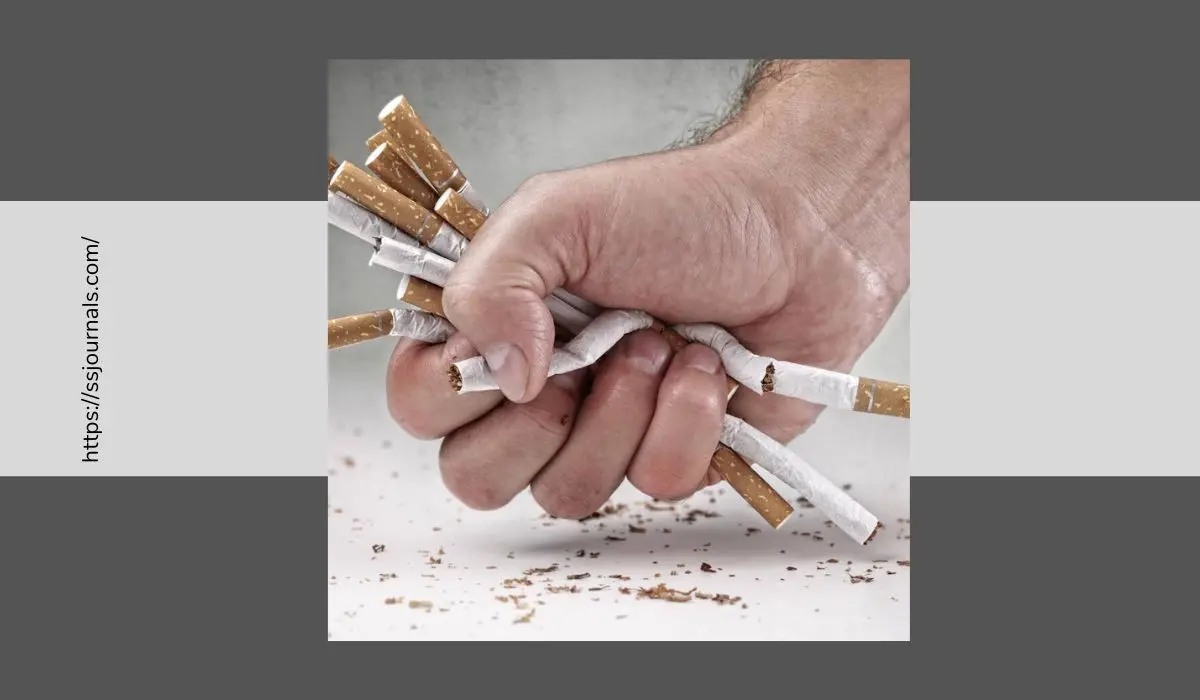Quitting smoking can be one of the most challenging yet rewarding things you’ll ever do for your health and well-being. Smoking is highly addictive, so giving up cigarettes often requires a multifaceted plan, commitment, and patience. The good news is that while quitting “cold turkey” works for some, most people can quit smoking naturally with the right holistic techniques and lifestyle changes.
In this comprehensive guide, we’ll explore proven natural aids, supplements, food strategies and behavior modifications to help you quit smoking step-by-step. With determination and a holistic approach, you can overcome dependence on cigarettes.
Why Quit Smoking?

Before we dive into how to quit, let’s review the many benefits of becoming smoke-free:
➔ Improves lung capacity and reduces coughing
➔ Lowers risk of lung cancer and respiratory illnesses
➔ Reduces risk of heart attack and stroke
➔ Helps prevent cancer of the mouth, throat, larynx, bladder, kidney and pancreas
➔ Decreases blood pressure and circulatory problems
➔ Improves fertility and reproductive health
➔ Boosts immune system function
➔ Enhances sense of taste and smell
➔ Eliminates stale smoke smell in clothes, hair, and home
➔ Saves money otherwise spent on expensive cigarette packs
As you embark on your smoke-free journey, keep these incentives in mind. Write down exactly why you want to quit and your motivations to overcome this addiction.
Set A Quit Date
Choose a specific day 1-2 weeks out to be your official quit date. This gives you a little time to prepare and get supplies. Tell loved ones about your quit date so they can support you.
Once you commit to a firm date, you’ll notice cigarettes start to taste worse. Stick to your date, knowing the cravings will be temporary. The first 1-2 weeks will be the biggest hurdle, so clear your schedule, reduce stressors, and make quitting your top priority in the coming weeks.
Adopt A Positive Mindset
Your mindset and beliefs around quitting smoking play a huge role in your likelihood of success.
Here are tips for adopting an empowering mindset:
◾️ Visualize yourself as a nonsmoker – how will you look, feel and act?
◾️ Focus on all the benefits you’ll gain rather than what you’re “giving up.”
◾️ Be kind to yourself if you experience stumbles or slip-ups. Just restart!
◾️ Remind yourself that cravings are temporary waves that will soon pass.
◾️ Spend time in nature and practice gratitude to boost positive emotions.
◾️ Try daily affirmations like “I am a nonsmoker” or “My body heals more each smoke-free day.”
Cleanse Your Environment
In the days leading up to your quit date:
- Clean your house and car thoroughly to remove all smoke smells.
- Wash all clothes that smell like smoke.
- Toss all cigarettes, lighters, and ashtrays.
- Avoid stores where you buy cigarettes.
- Make your home and car 100% smoke-free zones.
Stock Up On Supplies
Obtain items to help distract from cravings and cope with withdrawal:
For oral fixation:
- cinnamon sticks
- toothpicks
- plastic straws
- sugar-free gum
- sunflower seeds
For nicotine cravings:
- nicotine patches
- nicotine gum or lozenges
- black peppercorns
For anxiety and stress:
- herbal tea
- adult coloring books and crayons
- essential oils like lavender
- Epsom salts for baths
For withdrawal symptoms:
- Cinnamon, licorice, and peppermint for nausea
- Magnesium, calcium, potassium supplements
- throat lozenges
- eucalyptus balm for chest congestion
- chamomile, passionflower, and valerian tea for sleep
Start Taking Supplements
Two weeks before your quit date, begin taking supplements that can help minimize cravings and withdrawal symptoms:
B vitamins – replace nutrients depleted by smoking and reduce stress. Take a high-quality B-complex.
Vitamin C – helps repair lung tissue damage and boosts the immune system. Take 1,000 mg 2-3x daily.
Probiotics – supports healthy gut bacteria and brain chemistry.
Omega-3 fatty acids – help stabilize mood and thinking.
Glutamine – lessens cravings for sugar, caffeine and alcohol.
Milk thistle – aids liver detoxification.
5-HTP – converts to serotonin which promotes relaxation.
NAC – helps restore depleted levels of dopamine.
Discuss adding these and other supplements with your healthcare provider.
Make Dietary Changes
Optimizing your diet can reduce cravings, support detoxification, and minimize withdrawal discomfort:
- Stay hydrated with plenty of water and herbal tea.
- Eat more fruits and cruciferous vegetables.
- Choose whole grains and nuts/seeds for steady energy.
- Eat yogurt and fermented foods to support gut health.
- Limit caffeine, alcohol, sugar and refined carbs.
- Take a high-quality multivitamin and mineral supplement.
- Suck on cinnamon sticks or chew gum when cravings strike.
Lean On Social Support
Don’t try to quit alone. Lean on loved ones for support and join an online or in-person support group. Ask friends and family not to smoke around you and talk to you if you slip up. Share your quit date and progress on social media. Getting encouragement from people who care about you makes a big difference.
Adopt Helpful Lifestyle Changes
- Exercise daily – even light walking helps relieve stress and pent-up energy.
- Pick up hobbies or activities that keep your hands busy.
- Practice relaxation techniques – deep breathing, yoga, meditation.
- Get 6-8 hours of quality sleep nightly.
- Avoid caffeine, alcohol, and other triggers.
- Drink lemon water first thing in the morning.
- Take up journaling to manage racing thoughts.
Manage Nicotine Withdrawal Symptoms
Withdrawal peaks within the first 1-3 days and subsides over 2-4 weeks. Here are tips for coping with common symptoms:
Cramps – Stretch, massage areas, apply heat pads, and take Epsom salt baths.
Headaches – Peppermint essential oil, hydration, feverfew supplement.
Fatigue – Naps, moderate exercise, rhodiola or ginseng supplements.
Constipation – Fiber, exercise, probiotics, magnesium citrate.
Coughing – Licorice, marshmallow root, ginger tea, cough drops.
Irritability – Chamomile tea, L-theanine supplement, meditation.
Insomnia – Calming tea, melatonin, magnesium, no screens before bed.
Anxiety – Lavender aromatherapy, journaling, CBD oil.
Be patient and remind yourself discomfort is temporary. If symptoms persist or worsen, see your doctor.
Cope With Nicotine Cravings
When an intense urge to smoke hits try these fast techniques:
- Take 10 slow deep breaths.
- Drink a glass of water or juice.
- Take a brisk walk outside.
- Sniff a refreshing essential oil like peppermint or eucalyptus.
- Eat a healthy snack like nuts or crunchy veggies.
- Call a support person or text hotline like SmokefreeTXT.
- Watch funny pet videos to boost mood.
- Take a shower or wash your face with cold water.
- Chew cinnamon sticks, licorice root, ginger or gum.
- Squeeze a stress ball.
Cravings only last a few minutes. Distract yourself and ride out the wave. Over time, cravings will decrease in frequency and intensity.
Be Prepared For Setbacks
Slips and setbacks are common. Don’t let one cigarette turn into a full relapse. Rededicate yourself to your goals. Learn from what triggered the slip, forgive yourself quickly, and continue forward smoke-free.
Celebrate Milestones
Marking achievements keeps you motivated. Do something special each week and month like getting a massage, having your favorite meal, seeing a show, or doing an activity you enjoy. Share milestones with your support community.
Transition to Becoming a Lifelong Nonsmoker
Once you make it through the first month, focus on making permanent lifestyle changes that support your smoke-free self-image. Adjusting your mindset, habits, social circle, and environment are all key.
With each month, smoking will feel less like your identity. Stick with supplements and healthy habits that keep cravings at bay. Consult your doctor before fully discontinuing nicotine replacement therapy or medication.
You Can Quit Smoking Naturally
Quitting cigarettes for good is a challenging process, but with healthy lifestyle changes, natural aids, social support, and sticking to your motivations, you can overcome nicotine addiction.
Be patient with lapses, stay focused day by day, and celebrate each smoke-free milestone. Your hard work will pay off with a vastly improved quality of life, health, and well-being. Soon you’ll feel the benefits of being a nonsmoker and never want to go back.
More: Does Heat Help Nerve Pain? Discover The Surprising Solution

